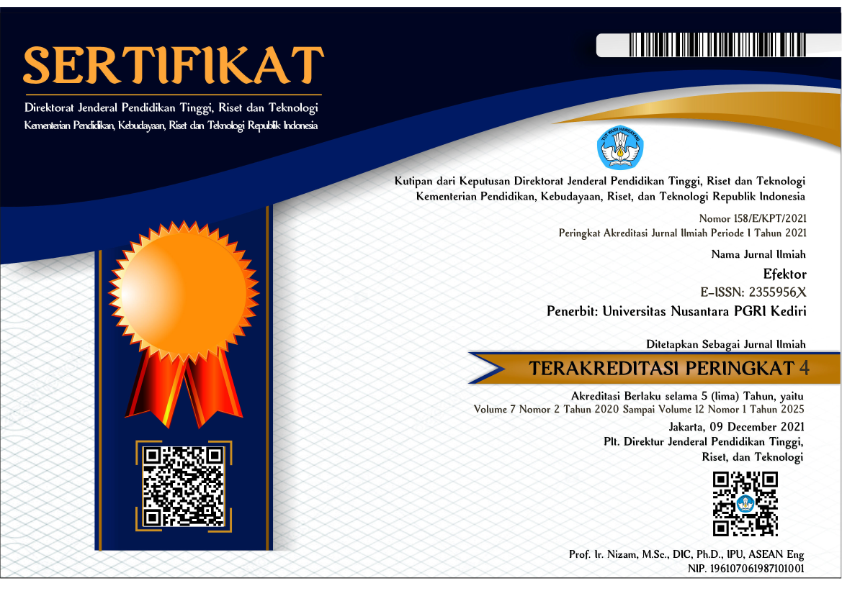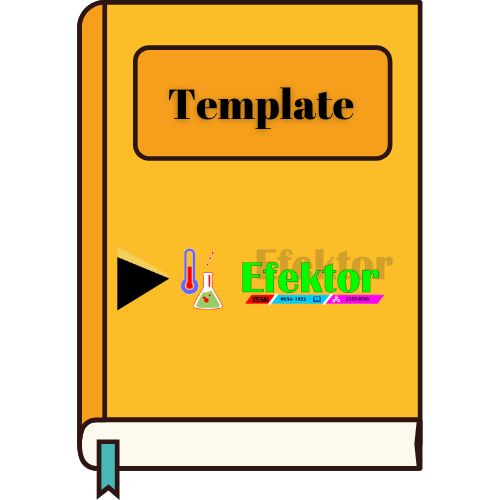Self-Efficacy dan Kepuasan Kerja pada Guru Taman Kanak-Kanak (TK)
DOI:
https://doi.org/10.29407/e.v7i1.14398Keywords:
self-efficacy, job satisfaction, teachers, kepuasan kerja, guruAbstract
The purpose of this research is to find out the relathionship between self-efficacy and job satisfaction teacher at Preschool. This research is quantitative using correlation technique. The population is the teachers at Preschool ‘Aisyiyah Bustanul Athfal Gresik. Incidental sampling was used and 98 teachers have been selected as sample. The instrument was used by the reseachers were self-efficacy and job satisfaction scale. The correlation test result shows r = 0,127, p= 0,213 (p>0,05). Based on correlation test result, it can be consluded that Ha rejected and H0 accepted. There is no positive relationship between self-efficacy and job satisfaction teacher at Preschool.
References
Alsaraireh, F., Griffin, M.T.Q., Ziehm, S.R., Fitzpatrick, J.J (2014). Job satisfaction and turnover intention among Jordanian nurses in psychiatric units. International Journal of Mental Health Nursing, 23, 460-467. DOI: 10.1111/inm.12070
Anoraga, P. (2009). Psikologi Kerja. Jakarta : PT Asdi Mahasatya.
Azwar, S. (2014). Metode Penelitian. Yogyakarta: Pustaka Pelajar.
--------------- (2015). Reliabilitas Dan Validitas. Yogyakarta : Pustaka Belajar.
Badan Pusat Statistik. Data Jumlah Guru Di Indonesia. https://www.bps.go.id/statictable/2015/09/10/1809/jumlah-sekolah-guru-dan-murid-taman-kanak-kanak-tk-di-bawah-kementrian-pendidikan-dan-kebudayaan-menurut-provinsi-tahun-ajaran-2011-2012-2015-2016.html, diakses pada tanggal 14 November 2017.
Bandura, A. (1997). Self Efficacy The Exercise Of Control. New York: W.H Freeman and Company.
Cahyono, M. Y. (2015). Teacher Self-Efficacy dan Komitmen Organisasi pada Guru TK dan SD di Sekolah Plus Kota Bandung. Humanitas, 2 (1), 29-46.(Online),(http://majour.maranatha.edu/index.php/hmn/article/view/1704), diakses 2 November 2017.
Dewi, P. E., & Dewi, I. G. (2015). Pengaruh Self Efficacy Dan Motivasi Kerja Pada Kepuasan Kerja Karyawan Happy Bali Tour & Travel Denpasar. Jurnal Manajemen, Strategi Bisnis dan Kewirausahaan, 9 (1), 15-25. (Online),(https://ojs.unud.ac.id/index.php/jmbk/article/download/14396/9894/), diakses 10 November 2017
Ghufron, M. N., & Risnawita, R. (2014). Teori - Teori Psikologi. Yogyakarta: Ar-Ruzz Media.
Handoko, T. H. (2014). Manajemen personalia & Sumberdaya Manusia Edisi 2. Yogyakarta: BPFE-Yogyakarta.
Hartawati, D., & Mariyati, S. (2014). Hubungan Antara Self-efficacy Dengan Burnout Pada Pengajar Taman Kanak-Kanak Sekolah "X" Di Jakarta. Jurnal Psikologi 12 (2), 54-60. (Online), (http://journal.unair.ac.id/filerPDF/jppp2a9996ff38full.pdf), diakses 2 November 2017.
Kilapong, S. N. (2013). Kepemimpinan Transformasional, Self Efficacy, self Esteem Pengaruhnya Terhadap Kepuasan Kerja Karyawan PT. Tropica Cocoprima Manado. Jurnal EMBA, 1 (4), 141-150. (Online), (https://ejournal.unsrat.ac.id/index.php/emba/article/view/2645), diakses 2 November 2017.
Munandar, A. S. (2014). Psikologi Industri dan Organusasi. Jakarta: UI Press.
Rahman, U. (2013). Efikasi Diri, Kepuasan Kerja, Dan Organizational Citizenship Behavior Pada Guru MAN Di Sulawesi. Lentera Pendidikan. 16 (1), 115. (Online),(http://journal.uinalauddin.ac.id/index.php/lentera_pendidikan/article/view/493), diakses 2 November 2017.
Sardiman. (2014). Interaksi & Motivasi Belajar Mengajar. Jakarta: PT. RajaGrafindo Persada.
Solichin, M. R. (2013). Pengaruh Kepuasan Kerja Dan Stres Kerja Terhadap Kinerja Guru Dalam Meningkatkan Mutu Akademik Lulusan Pada SMA RSBI Di Kabupaten Sidoarjo. Jurnal Ekonomi Pendidikan dan Kewirausahaan, 1(1). (Online), (https://journal.unesa.ac.id), diakses 10 November 2017.
Spector, P. E. (1997). Job Satisfaction Application, Assessment, Causes, and Consequences. California: Sage Publications.
Sugiyono. (2016). Metode Penelitian Pendidikan Pendekatan Kuantitatif,Kualitatif, dan R&D. Bandung: Alfabeta.
Suharsono, Y., & Istiqomah. (2014). Validitas Dan Reliabilitas Skala Self Efficacy. Jurnal Ilmiah Psikologi Terapan, 2 (1), 144-151. (Online) (http://ejournal.umm.ac.id/index.php/jipt/article/view/1776/1864), diakses 18 April 2018.
Sujarweni, W. (2014). Metodologi Penelitian Lengkap, Prkatiks, dan Mudah Dipahami. Yogyakarta: Pustakabarupress.
Sutanto, S. (2005). Menggunakan SPSS untuk Statistik Parametrik. Jakarta : Gramedia.
Tirtarahardja, U., & Sulo, L. (2012). Pengantar Pendidikan. Jakarta: Rineka Cipta.
Waluyo, M. (2013). Psikologi Industri. Jakarta: Akademia.
Wijono, S. (2015). Psikologi Industri & Organisasi Edisi Revisi. Jakarta: Prenadamedia Group.
Downloads
Published
Issue
Section
License
Authors who publish with this journal agree to the following terms:
- Copyright on any article is retained by the author(s).
- The author grants the journal, the right of first publication with the work simultaneously licensed under a Creative Commons Attribution License that allows others to share the work with an acknowledgment of the work’s authorship and initial publication in this journal.
- Authors are able to enter into separate, additional contractual arrangements for the non-exclusive distribution of the journal’s published version of the work (e.g., post it to an institutional repository or publish it in a book), with an acknowledgment of its initial publication in this journal.
- Authors are permitted and encouraged to post their work online (e.g., in institutional repositories or on their website) prior to and during the submission process, as it can lead to productive exchanges, as well as earlier and greater citation of published work.
- The article and any associated published material is distributed under the Creative Commons Attribution-ShareAlike 4.0 International License













